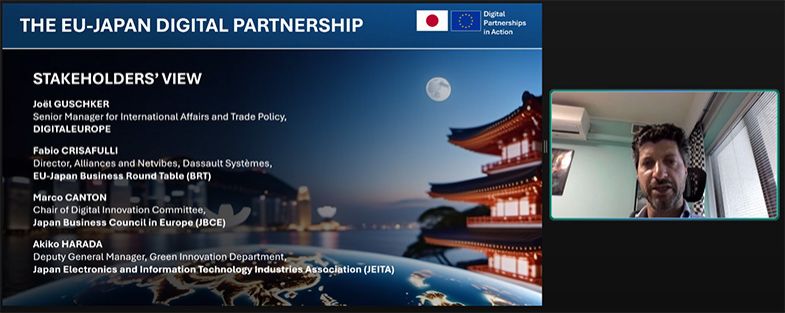
Since 2024, the BRT has received invitations to take part in meetings on EU-Japan related topics to give an EU-Japan business perspective to the issue being discussed. On the BRT participation in policy events webpage you can find summaries of BRT contributions to policy-based events organised by think tanks. Below you can find summaries of BRT contributions to stakeholder events organised by the EU and Japanese Authorities and linked to their formal government-to-government level dialogues.
On this webpage : Events linked to the Japan-EU Digital Partnership Council | Events linked to the EU-Japan Industrial Policy Dialogue (IPD) | Events linked to the EU-Japan EPA's Trade & Sustainable Development Chapter | Other discussions
The Japan-EU Digital Partnership was announced at the 28th EU-Japan Summit in May 2022 and addresses: Secure 5G; Beyond 5G/6G technologies; Safe and ethical applications of artificial intelligence; and The resilience of global supply chains in the semiconductor industry. Digital Partnership Councils were held on 03/07/2023, 30/04/2024 and 12/05/2025. The BRT was invited to take part in stakeholder events organised to prepare the Digital Partnership Councils:
On 5 March, the BRT took part in a "Stakeholders' Roundtable - Thematic Webinar and a reception alongside the 30th the EU-Japan ICT Dialogue on Digital Connectivity". The Stakeholders' Roundtable focused on Artificial Intelligence, Cybersecurity, and Connectivity (5G/6G & Arctic connectivity) organised by DG CNECT and Japan’s Digital Agency as preparation for the 3rd EU-Japan Digital Partnership Council.
 Fujitsu leads the Japan-side of the BRT's Working Party on Digital Innovation & Mobility (WP3). Marco Canton, Senior European Affairs Executive at Fujitsu, represented the BRT, speaking during the 'Opening Remarks' session. During his presentation, Mr Canton emphasised that the BRT serves as a key platform for cooperation between industry and government, provides recommendations to the EU and Japanese Authorities that were delivered earlier that week to European Commission EVP Stéphane Séjourné. Mr Canton highlighted the need for stronger EU-Japan cooperation in quantum technologies, not just in the research phase but also in the technologies’ deployment. He welcomed the negotiations on Japan becoming an associated country for Horizon Europe. He emphasised the need for the EU to issue clear guidelines on the implementation and enforcement of the EU's Data Act, as AI without data is not possible. He highlighted the need to have concrete projects within the framework of the EU-Japan Digital Partnership suggesting as instance to start an AI Sandbox project where European and Japanese companies of different size could jointly test AI solutions that could work on both Countries. Finally, Mr Canton emphasised the importance of EU-Japan cooperation in the current geopolitical situation, advocating for cooperation and openness rather than building new walls.
Fujitsu leads the Japan-side of the BRT's Working Party on Digital Innovation & Mobility (WP3). Marco Canton, Senior European Affairs Executive at Fujitsu, represented the BRT, speaking during the 'Opening Remarks' session. During his presentation, Mr Canton emphasised that the BRT serves as a key platform for cooperation between industry and government, provides recommendations to the EU and Japanese Authorities that were delivered earlier that week to European Commission EVP Stéphane Séjourné. Mr Canton highlighted the need for stronger EU-Japan cooperation in quantum technologies, not just in the research phase but also in the technologies’ deployment. He welcomed the negotiations on Japan becoming an associated country for Horizon Europe. He emphasised the need for the EU to issue clear guidelines on the implementation and enforcement of the EU's Data Act, as AI without data is not possible. He highlighted the need to have concrete projects within the framework of the EU-Japan Digital Partnership suggesting as instance to start an AI Sandbox project where European and Japanese companies of different size could jointly test AI solutions that could work on both Countries. Finally, Mr Canton emphasised the importance of EU-Japan cooperation in the current geopolitical situation, advocating for cooperation and openness rather than building new walls.
Other speakers included representatives of two other organisation affiliated with the BRT:
A brief final report on the "Stakeholders' Roundtable - Thematic Webinar and a reception alongside the 30th the EU-Japan ICT Dialogue on Digital Connectivity" was published on the event webpage.
On 17 April, by way of preparation for the 2nd Japan-EU Digital Partnership Council that took place on 30 April, DG CNECT and Japan’s Digital Agency organised a Public-Private Stakeholder Workshop. Fabio Crisafulli from Dassault Systèmes represented the BRT and took part in an overarching session entitled, “The EU-Japan Digital Partnership – Stakeholders’ View”.
During his intervention, Mr Crisafulli shared some of BRT WP3’s key recommendations from 2023:

Two BRT member organisations also took part in the session: DIGITALEUROPE (represented by Joël Guschker) emphasised the importance of the G7 Hiroshima AI Guiding Principles; EU-Japan collaborations on 6G vision and standardisation and on post-quantum cryptography; DFFT and seamless data transfers; involving stakeholders in regular EU-Japan strategic dialogues. JBCE (represented by Marco Canton) identified 3 areas for enhanced EU-Japan collaboration: Japan getting associated country status in Horizon Europe, DFFT with a focus on interoperability and interconnections between EU and Japanese data spaces and harmonising standards. JEITA also spoke during this session. The rest of the stakeholder workshop featured thematic discussions around the potential for EU-Japan collaborations on AI (including a second presentation by JBCE), semiconductors, quantum computing, cybersecurity, submarine cables (including a presentation by NEC) and on digital identity.
Two reports on the 'EU-Japan Digital Partnership - Public-Private Stakeholder Workshop' are available: a detailed final report and a brief final report.
On 30/04/2024, at the conclusion of the 2nd EU-Japan Digital Partnership Council meeting in Brussels, the formal Joint Statement issued by the European Commission, MIC, METI and the Digital Agency referred to the BRT in the English and Japanese versions of their Joint Statement.
The EU-Japan Industrial Policy Dialogue (IPD) is a long-standing annual dialogue (the 26th one took place in 2025) between the DG GROW Director-General and the METI Vice-Minister for International Affairs around issues of mutual interest covering competitiveness and industrial policy. It reviews the work of the EU-Japan Centre for Industrial Cooperation and the activities of the BRT. It has 6 technical working groups that report to the annual IPD meeting: standards and conformity assessment, automotive, corporate social responsibility, chemicals, environment/climate change, and robotics. In recent years, the BRT has been invited to take part in stakeholder events organised on the fringes of the IPD meeting:
On 21 February, the BRT took part in an EU-Japan Business-to-Government (B2G) meeting entitled “Identifying concrete opportunities for EU-Japan industrial cooperation in a new geopolitical era” and held on the fringes of the annual EU-Japan Industrial Policy Dialogue (or "IPD") led by DG GROW and METI.
After METI and DG GROW presented the key conclusions of the IPD, the BRT co-Chair companies (NEC and Merck) shared their views on how best to structure joint engagement with business and how the private sector can support the design of new public-private partnerships. Topics raised during the meeting included supply chain resilience, connectivity, the need for a high level of trust in the market, the importance of having a clear and predictable regulatory environment with regulations that promote competition while ensuring safety. The second part of the meeting focused on EU-Japan cooperation in cleantech.
 NEC's Dr Endo (Chair of the BRT's Japan-side) welcomed the Authorities' decision to invite industry to take part in the discussion seeing it as a proof of the strong trust between Japan and the EU which promotes a high-value co-creation that individual countries or companies could not achieve alone. Thanks to this trust, Japanese and EU companies have been establishing a mutually beneficial vice versa business relationship, which leads to a robust supply chain. Ensuring the resilience of supply chains is a key aspect of economic security and a focus for the Japan-EU relationship for the coming years as countries seek to balance self-sufficiency and enhance cross-border supply chain resilience whilst strengthening high value global value chains that focus on raw materials, semiconductors, technology, and data to increase their contribution to human society. Advanced technologies can reduce environmental impact and drive sustainable growth. To achieve carbon neutrality through the green transformation, cutting edge technologies in areas such as power generation, consumption or grids that take account of each country’s own energy situation and national globally optimised solutions are needed. These are all issues that the BRT will continue to address.
NEC's Dr Endo (Chair of the BRT's Japan-side) welcomed the Authorities' decision to invite industry to take part in the discussion seeing it as a proof of the strong trust between Japan and the EU which promotes a high-value co-creation that individual countries or companies could not achieve alone. Thanks to this trust, Japanese and EU companies have been establishing a mutually beneficial vice versa business relationship, which leads to a robust supply chain. Ensuring the resilience of supply chains is a key aspect of economic security and a focus for the Japan-EU relationship for the coming years as countries seek to balance self-sufficiency and enhance cross-border supply chain resilience whilst strengthening high value global value chains that focus on raw materials, semiconductors, technology, and data to increase their contribution to human society. Advanced technologies can reduce environmental impact and drive sustainable growth. To achieve carbon neutrality through the green transformation, cutting edge technologies in areas such as power generation, consumption or grids that take account of each country’s own energy situation and national globally optimised solutions are needed. These are all issues that the BRT will continue to address.
 Merck’s Chris Thomas (Vice-Chair of the BRT's EU-side) underlined that having a regular B2G dialogue is key and that the BRT's objective is ensuring that policies are well informed by industry insights and address clear challenges faced by society. To boost investment and innovation, regulatory frameworks should be clear and predictable and have a strong Intellectual Property mechanism. Regulations should be transparent and promote competition while ensuring consumer protection and environmental sustainability and that the EU and Japan should pursue negotiating trade agreements, reducing trade barriers, and promoting exports building on the success of their EU-Japan EPA.
Merck’s Chris Thomas (Vice-Chair of the BRT's EU-side) underlined that having a regular B2G dialogue is key and that the BRT's objective is ensuring that policies are well informed by industry insights and address clear challenges faced by society. To boost investment and innovation, regulatory frameworks should be clear and predictable and have a strong Intellectual Property mechanism. Regulations should be transparent and promote competition while ensuring consumer protection and environmental sustainability and that the EU and Japan should pursue negotiating trade agreements, reducing trade barriers, and promoting exports building on the success of their EU-Japan EPA.
In a LinkedIn post, Kerstin Jorna (Director General of DG GROW) who led the IPD meeting for the Commission explained that the EU and Japanese Authorities, "care about economic security, sustainable and resilient supply chains. And the business case underlying them. That is why we also exchanged with companies from Europe and Japan. Where are the opportunities and where are the challenges? A most useful conversation. Which will be continued!"
Chapter 16 of the EU-Japan EPA addresses Trade & Sustainable Development. Under that chapter, the EU and Japan have created "Domestic Advisory Groups" (DAGs) to address economic, social and environmental issues and the EU and Japan organise a Joint Dialogue with civil society organisations. In 2025, the BRT was invited to take part in a workshop organised on the fringes of the Joint Dialogue with civil society organisations.
On 24 June, the BRT took part in a workshop on “Artificial Intelligence and its impact on the workplace, employment and competitiveness” organised in the framework of the EU-Japan Joint Dialogue with civil society under the EU-Japan Economic Partnership Agreement (EPA).

Left – Mr Okabe's presentation, Right top – Mr Canton, Right bottom – Mr Okabe
Dassault Systèmes K.K. leads the EU-side of the BRT's Working Party on Digital Innovation & Mobility (WP3). Hideyuki Okabe, Japan Solution Architect Senior Expert at Dassault Systèmes K.K., represented the BRT and spoke during a session on ‘AI as a Driver for Growth and Competitiveness’. He began by explaining that the BRT’s WP3’s discussions of AI focused on human centred AI, the EU AI Act and a wish to see strengthened cooperation between the EU and Japan on AI issues. He then outlined Dassault Systèmes AI portfolio – from 3D modelling initially of small items then of very large items, through virtual twins to ‘3D UNIV+RSES’ in which AI plays a key role. Dassault uses Industry AI as a white box. Virtual twins allow data to be correctly predicted, interpreted and controlled, thereby leveraging knowledge and know how. Virtual twins can model and simulate all parts of a process and integrate scientific modelling going beyond simply animating the process. Virtual twins can produce data to train the AI. Knowledge and know how are key – so the more knowledge a company has the more attractive it will be to potential new talent – AI can be a clear differentiator a well as being a new door to the knowledge economy.
Another speaker in the session included a representative of two other organisations affiliated with the BRT: Marco Canton (Chair – Digital Innovation Committee, JBCE and Senior European Affairs Executive at Fujitsu Limited) explained that, for many companies, AI’s impact has been to create new KPIs for business success such as ‘return on employee’ rather than ‘return on investment’. Thanks to AI, people have more time to work in teams and can work more empathetically and more cooperatively. As a result, workers can become more positive about the company they work for as AI takes over previous tasks giving them more time to address new things. AI drives automation and how it impacts on a company’s growth. But AI creates societal challenges that governments and stakeholders need to time to address. Reskilling workers takes time and money. The WEF Future of Jobs Report 2025 suggests that AI will create more jobs than it destroys. For example, there are currently more vacancies than skilled candidates for cybersecurity-related positions. Strong cooperation between government, industry and academia is needed.
For Mr Canton, in today’s rapidly evolving industrial landscape, AI is no longer just a tool – it is becoming a co-worker, a strategist, and a silent problem solver operating in real time. Across factories, design labs, and logistics centres, AI systems are performing tasks that once required teams of skilled engineers, operators, and planners. AI in industry today is not about replacing jobs – it is about amplifying human potential. Engineers become designers of systems, not just fixers of problems. Operators become supervisors of smart agents. And factories evolve from static infrastructure into intelligent, adaptable ecosystems. The EU and Japan have both the responsibility and the opportunity to model how democratic societies can lead technological change responsibly. By aligning regulation with innovation and by developing infrastructure rooted in trust, we can offer a powerful alternative to the binary paths of authoritarian control or unbridled commercialism. The EU–Japan partnership has the capacity to become not just architects of digital trade, but architects of the digital future – one that is equitable, resilient, and deeply human-centred.
The Workshop’s other sessions addressed an ‘Introduction to AI in the workplace’ and ‘The AI-driven workplace and AI and Employment – Opportunities and Challenges’. Should an official report on the workshop published this post will be updated to link to it.
On 16 September, thirteen senior executives from BRT member companies active in the energy and decarbonisation sectors met European Commission Director-General for Energy, Ditte Juul Jørgensen, for a breakfast meeting. She was visiting Japan for a series of high-level meetings, including the EU-Japan High-Level Dialogue on Energy. During the meeting, they discussed:
A brief report on and photos from the meeting can be found in a LinkedIn post by the EU-Japan Centre.
The EU-Japan Centre currently produces 5 newsletters :









